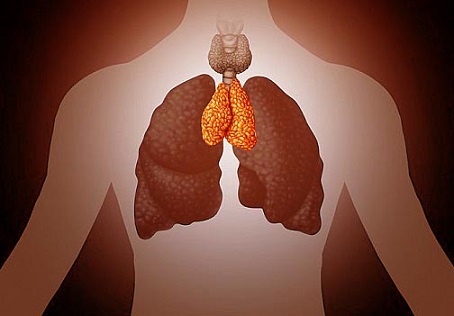Murine study shows that SARS-CoV-2 induces thymic atrophy and impairs T cell development
Charles Tee Fact checked by:Thailand Medical News Team Sep 12, 2024 7 months, 2 weeks, 9 hours, 50 minutes ago
Medical News: In the wake of the COVID-19 pandemic, much of the attention has been focused on respiratory symptoms, but growing research has identified several immunological complications as well. A murine study led by researchers from the Immuno-biology Lab and Immunology-Core Lab, Translational Health Science and Technology Institute (THSTI), NCR-Biotech Science Cluster, Faridabad, Haryana, India, delves into the effects of SARS-CoV-2 on the thymus and its implications for T-cell development. This
Medical News report will explore the study findings and their significance, shedding light on how the virus affects one of the body's key immune organs.
 Murine study shows that SARS-CoV-2 induces thymic atrophy and impairs T cell development
Understanding the Thymus and T-Cell Development
Murine study shows that SARS-CoV-2 induces thymic atrophy and impairs T cell development
Understanding the Thymus and T-Cell Development
The thymus plays a crucial role in the development of T-cells, a type of white blood cell essential for immune response. These cells mature in the thymus before migrating to peripheral tissues, where they help the body fight infections. Pathogenic infections, like SARS-CoV-2, can cause thymic atrophy, impair T-cell development, and disrupt the immune system.
The murine study used K18-hACE2 transgenic mice, which express the human ACE2 receptor that SARS-CoV-2 binds to, mimicking human infection. The researchers focused on how the virus induces thymic atrophy and hinders T-cell maturation. The findings offer crucial insights into immune dysregulation in COVID-19, particularly in the thymus.
Key Findings: Thymic Atrophy and T-Cell Apoptosis
One of the most striking findings from the study was the impact of SARS-CoV-2 on thymocytes, the precursor cells that mature into T-cells. The virus directly infected these cells, leading to a significant depletion of CD4+CD8+ (double positive, or DP) T-cells, which play a key role in immune defense. This depletion was attributed to increased apoptosis (programmed cell death) of thymocytes, resulting in severe thymic atrophy.
Interestingly, the study found that thymic atrophy was more pronounced in male mice than females. The underlying mechanism involved increased production of glucocorticoids within the thymus, which are known to suppress immune function. Infected mice also showed an accumulation of CD44+CD25 - T-cells, an indication of early arrest in the T-cell maturation pathway.
Role of IFN-γ in Thymic Atrophy
A key factor driving thymic atrophy in the study was interferon-gamma (IFN-γ), a cytokine that plays a central role in the immune response. Elevated levels of IFN-γ were observed in the thymus following SARS-CoV-2 infection. The study revealed that IFN-γ was critical for the atrophy process. When mice were treated with an anti-IFN-γ antibody, the thymic involution was significantly reduced, pointing to the cytokine's pivotal role in the destruction of thymic tissue during infection.
The therapeutic potential of IFN-γ neutralization is noteworthy, as it not only rescued the thymic atrophy but also r
estored the T-cell developmental pathway.
This finding suggests that targeting IFN-γ could be a viable strategy for mitigating immune dysregulation in COVID-19 patients.
Variants of SARS-CoV-2 and Their Impact on the Thymus
The study also compared the effects of different SARS-CoV-2 variants on thymic atrophy. While the Omicron variant and its BA.5 sub-lineage caused only marginal thymic atrophy, the Delta variant led to severe atrophy characterized by a dramatic depletion of DP T-cells. This finding underscores the varying impact of different viral strains on the immune system, with the Delta variant posing a higher risk for immune dysfunction.
Moreover, the researchers examined the effectiveness of a recently developed monoclonal antibody, P4A2, in rescuing thymic atrophy. The antibody, which broadly neutralizes SARS-CoV-2, was successful in restoring thymic function and aiding T-cell maturation, offering hope for future therapeutic interventions.
Broader Implications for Immune Response in COVID-19
The findings of this study offer critical insights into the immune dysregulation caused by SARS-CoV-2. Thymic atrophy, as induced by the virus, leads to a significant reduction in the T-cell receptor (TCR) repertoire, which may contribute to the impaired immune response observed in severe COVID-19 cases. The loss of peripheral TCR diversity can hinder the body's ability to mount an effective defense against the virus and other pathogens, making patients more susceptible to severe outcomes.
Furthermore, the study provides a possible explanation for the lymphopenia (reduced lymphocyte count) observed in COVID-19 patients, a condition that has been strongly correlated with higher morbidity and mortality. By impairing T-cell development in the thymus, SARS-CoV-2 disrupts the body's ability to replenish its T-cell population, leading to prolonged immune dysfunction.
Conclusion
The murine study on SARS-CoV-2-induced thymic atrophy offers a comprehensive understanding of how the virus affects the immune system beyond the well-documented respiratory symptoms. The researchers demonstrated that the virus directly infects thymocytes, leading to severe atrophy and impaired T-cell development. Elevated IFN-γ levels were identified as a key driver of this process, and neutralizing the cytokine proved effective in rescuing thymic function.
As the study suggests, thymic atrophy could be a major contributor to the long-term immune dysfunction seen in COVID-19 patients, making it a critical area for future research and therapeutic development.
The study findings were published in the peer-reviewed European Journal of Immunology.
https://onlinelibrary.wiley.com/doi/10.1002/eji.202350624
For the latest COVID-19 News, keep on logging to Thailand
Medical News.
Read Also:
https://www.thailandmedical.news/news/breaking-covid-19-news-italian-researchers-warn-that-sars-cov-2-can-infect-the-thymus-and-impair-t-cell-generation
https://www.thailandmedical.news/news/immunology-news-regulation-of-cytotoxic-t-cell-differentiation-and-exhaustion-by-mtor-signaling-unraveling-the-complexities-of-adaptive-immunity
